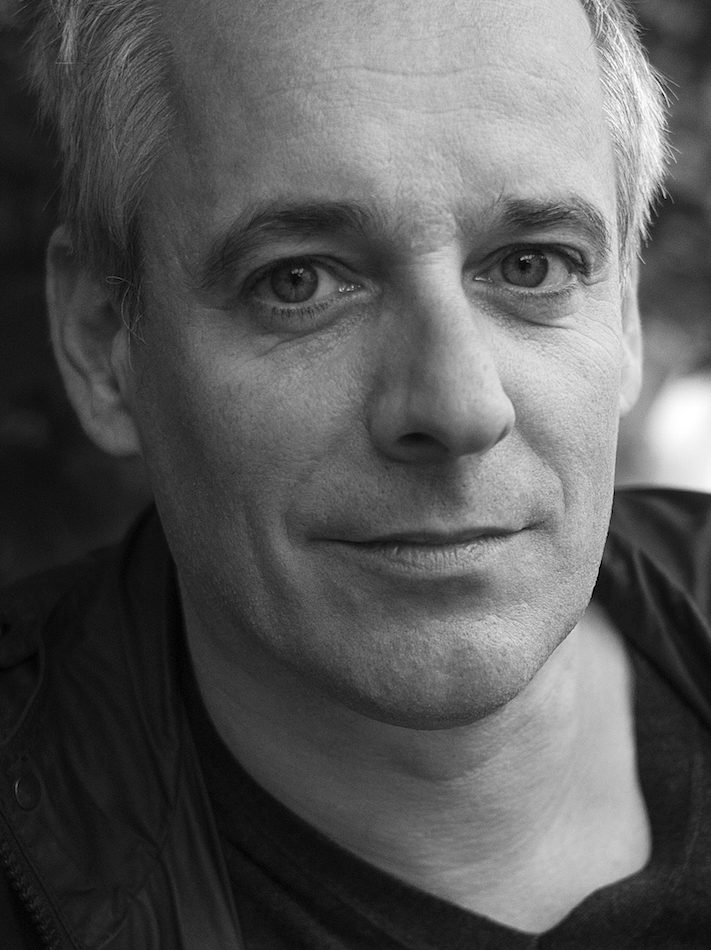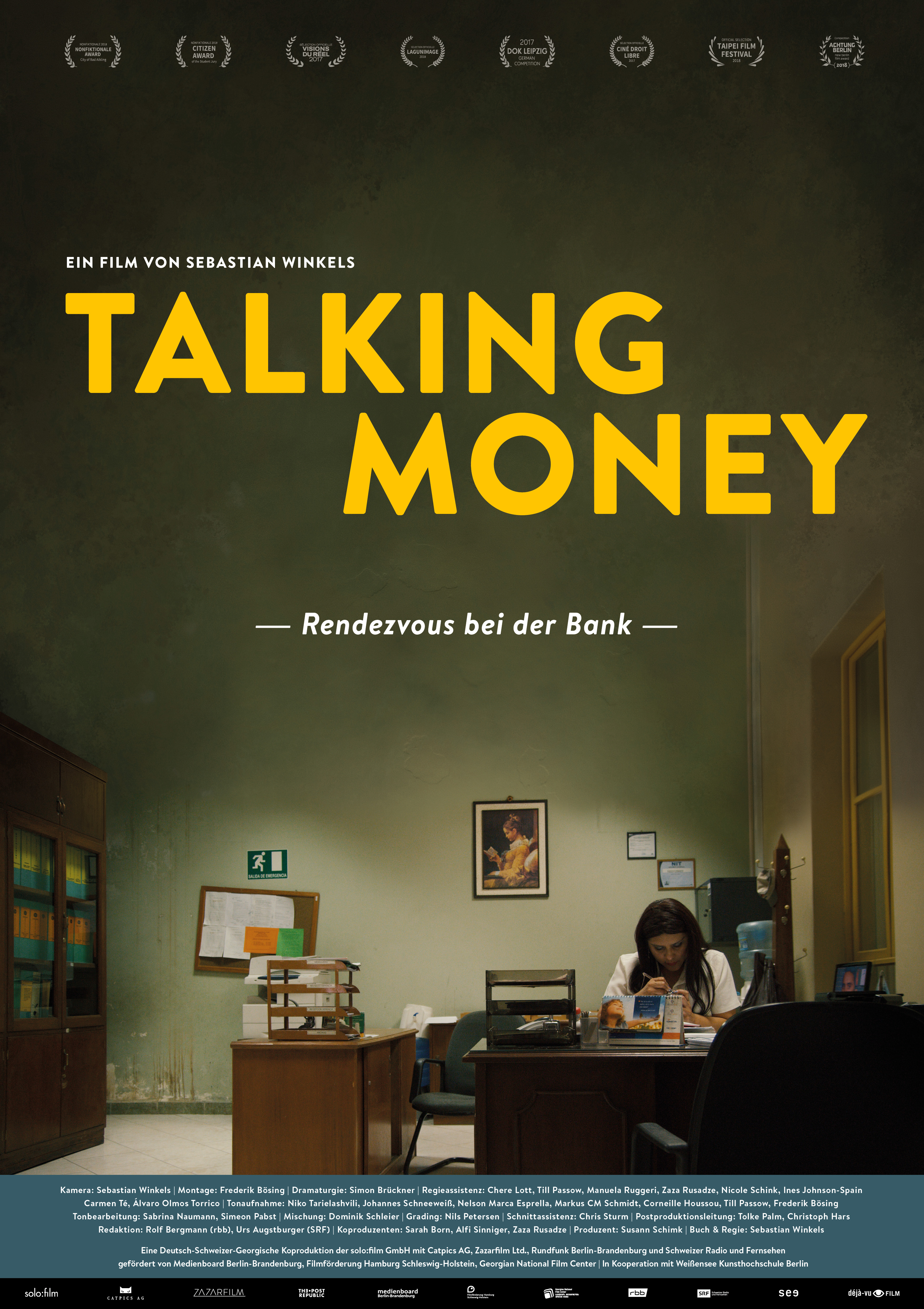Taiwanese film critic JANE YU asked SEBASTIAN WINKELS about his work.
Question: You say that the original idea for this documentary film came from your own experience?
Answer: Yes, the idea for Talking Money came up about five years ago, when I had my first banking appointment to apply for a loan. I sat across the desk from a bank employee and explained not only my financial situation, but also all of the other circumstances of my life. The situation was very psychologically charged and quite strange. I felt naked, since it’s really a very intimate situation in which one is compelled to present oneself. The personal, familial and social image of myself that I created there looked totally alien to me in the end, as if I had just described somebody else. I had the feeling that I couldn‘t even recognize myself, since I wanted to package myself smartly but, at the same time, take a critical stance toward the financial advisor. That‘s a real balancing act. The strongest thing that I sensed was the power that ruled over that desk. Every bank employee represents their institution, and the institution in turn represents the system in which we all function – which has the power at its command to finally decide whether to grant you a loan – or not.
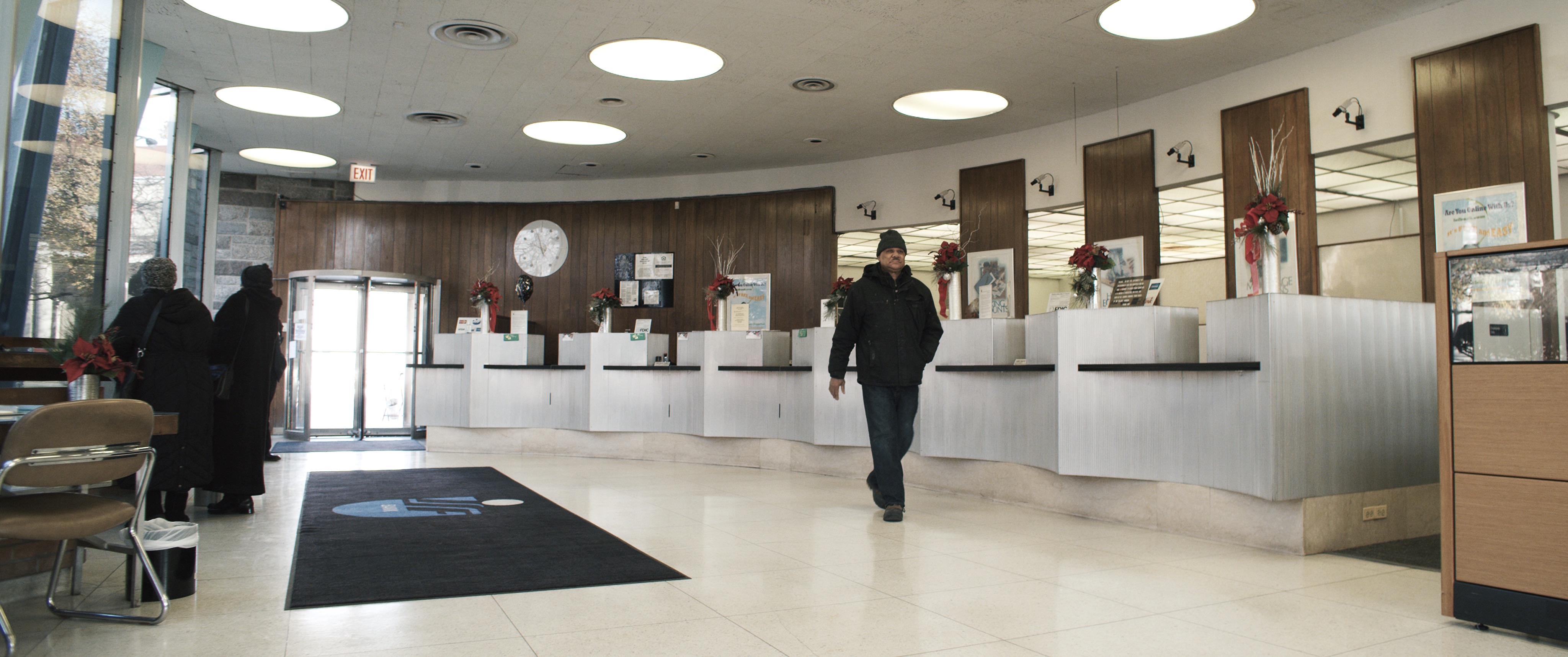
Question: Your films “7 Brothers” or “My beautiful life (Don’t swallow everything)” are also populated by people talking with each other within a truly minimalist setting, in film terms. What attracts you to documentary film?
Answer: It’s true. Most of all I need the dark movie theater as a storytelling space. My films usually focus on a particular communication situation and a specific function of language that shapes this situation. I structure the film shoot aiming to closely observe these particular aspects of language and interaction. We are dealing with really ephemeral things. It‘s not easy for the protagonists to be totally free and easy with themselves in front of the camera. If they do reach that point, it becomes instantly exciting because it‘s authentic – and that’s always something special that every viewer can feel and that can’t be explained. For me, that is the real draw of documentary, that the storytelling remains fragile and unpredictable and arises out of real, lived lives. Nobody has thought it up, written something down and then staged it. It‘s pure presence. Why my themes often deal with communication and language, I can‘t say; maybe it has something to do with my large family. In any case, I start to pursue a project when I discover a particular communication situation that occupies my mind long-term. Then I want to translate this situation into film in a way that – with a bit of luck – a genuine force can arise in the cinema. When this works, for me, then it’s because of an approach to filming that I call ‘social recording‘ or ‘social camera‘, and to the authenticity I already mentioned. This is exactly what I think about the most during the preparation phase. Because if something in the filming approach doesn‘t fit, it actually distorts the entire thing. Someone whose work I feel is excellent in this regard is Raymond Depardon – I think he’s the one who first awakened this particular interest in me.
Question: So how much do you know ahead of time? How do you prepare?
Answer: With Talking Money, it began with the question of whether we might become a different person as soon as we are talking about money, and if so, why that happens. Is it the same everywhere or does it depend on the cultural environment that has shaped us? How do we deal with the experience of power there at that desk? Ten years after the financial crisis, is there still any trust left, or are we just trying to mutually deceive each other with as many tricks as possible? In earlier times, the pastor, the doctor, the bank director used to be moral authorities. These days, how do we manage to share ownership or set boundaries? What is yours and what is mine and how do we negotiate that? This is a very old question. During the writing process usually the central question of a project reveals itself early on, such as, “What is family?“ for example, in the film “7 Brothers“, which is about passing on the tellings of life stories. I don‘t try to give a direct answer in a film, which can‘t even be done in the case of “7 Brothers“. Instead, I would like to incite the viewer to apply the story very individually to themselves, to take it rather personally and internally reflect on it. They can experience the film from their perspective as an only child, as a grandfather or as the second-youngest of five. For 86 minutes, one can be part of the Hufschmidt family of Mülheim an der Ruhr. The filmic composition should have the effect that you can‘t help becoming involved, for example by comparing it to yourself. Now that makes it sound somehow like work, and in fact, it is an active state. However, when a viewer fully delves into a narrative, it doesn’t feel like any effort; instead it feels easy, because it‘s fun when personal experiences and thoughts are allowed to be included in the film.
That’s why my films tend to have a slow pace. It needs this space and a kind of listening concentration that, for me, exists only in this form in a cinema. This concentration doesn‘t want to appear in an aggressively strict manner; instead ideally, it establishes itself casually. At least, that‘s the goal. I hope that one can enjoy it effortlessly, even though the films are meant to be taken very personally, and sometimes, as in the case of „My beautiful life“, which deals with the dilemma of dosing psychotropic drugs, they can really go for the jugular. I would like to contribute to allowing exactly such things to happen. At least, that‘s what I look for when I go to the cinema. I want to be allowed to lose myself within something. In a way I‘m even requesting it, that somebody will skillfully go for my jugular and deeply astonish me, because I want to come out of the film transformed. It should have done something to me. Sadly, we are overwhelmingly used to being bombarded with ‘facts‘ and are supposed to be always learning something – especially from a documentary film. As if that were a code word for “textbook of facts on film“, about some issue or other. We get told what is important, right and wrong and especially, what we‘re supposed to think about it. If something is meant to be sad, there‘s the corresponding music for it, and so forth. I‘m increasingly tired of this dramaturgical spoon-feeding that makes even the most exciting storytelling distanced and superficial. There‘s barely any inner dialogue there, just consumption. Somebody seems to know everything and I should follow. That narrative really flows in only one direction.
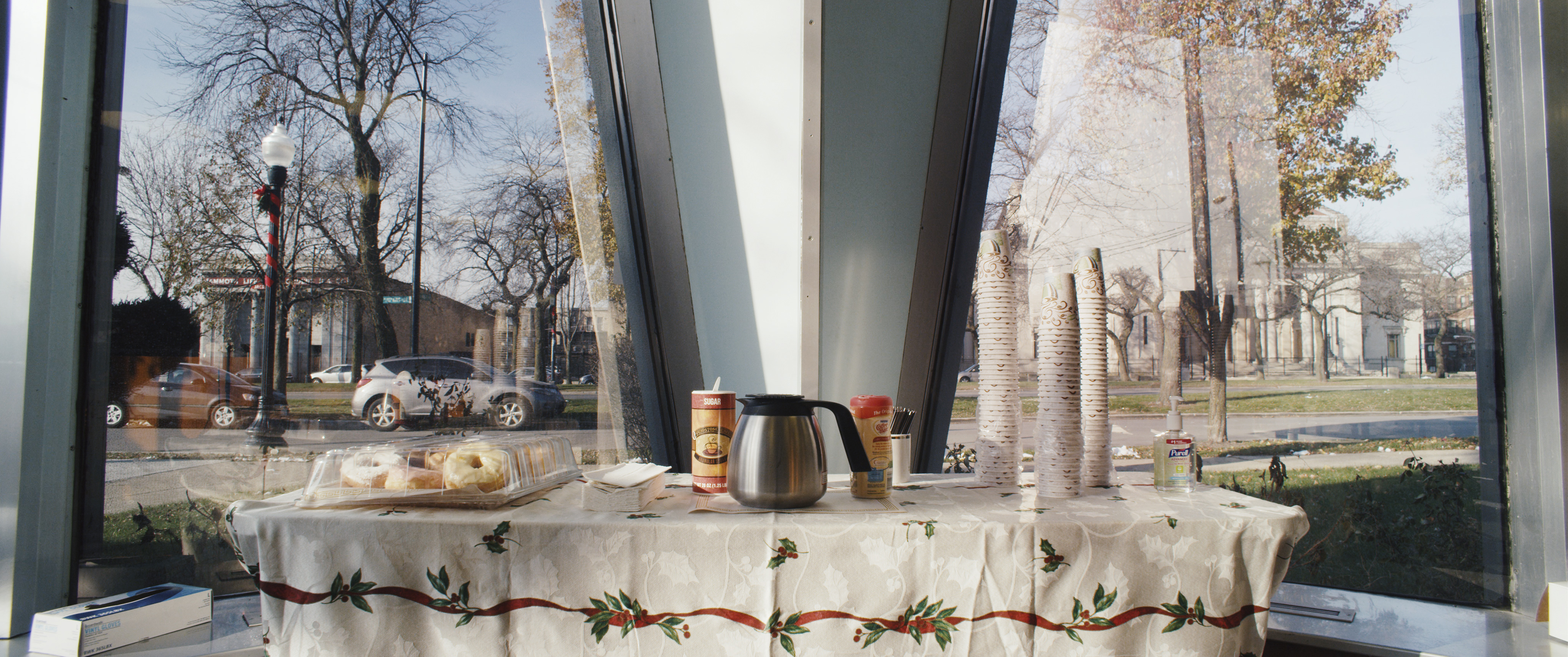
That’s why I say that it’s a good thing to find oneself in a consistent process of deceleration that allows the viewer to become part of the narrative. Of course, there‘s justification for issue-oriented films that are meant to educate and so on, but that is actually only a tiny part of what documentary film is capable of doing in cinema. Unfortunately, for years now, this part seems to have devoured everything else around it, as if this special power of the cinema to astonish us and thereby discover something about the ‘condition humaine‘ doesn‘t even exist. That makes me really furious, and that’s how, in a certain way, I’m even more obsessed with conveying my stories with all of their open endings into the minds of the viewers.
This concept, I would call it participative storytelling, means regarding the cinema in a literal sense as the location for the plot of the film and staging it with an economical use of means so that it can transform itself – in the case of Talking Money – into a bank. That can only work in an undisturbed continuum of time, without breaks in perspective or music, etc. It’s as if the movie theater itself, filled with the reactions of the audience, would play a part within the film. As a space for relationships. There, almost as if in a dream, we meet real people, and nothing else. Nothing is superimposed on this; it’s allowed to simply be as it is. The daydream is vital for cinema. This physical, so very real-feeling relationship between viewers and protagonists is possible only in documentary film because, even in the theater, everything is replayed anew each night. How crazy is that, actually? That‘s what excites me about this work, but often, that is exactly what gets shoved into the background of the narrative, maybe also because it‘s supposedly too delicate or just peripheral. In any case, it‘s diametrically opposed to a didactic cinema about “the universe explained for you in simple terms“. In my view, we take the power of the authentic too much for granted. On a closer look, it‘s actually pure magic. But now maybe I haven‘t even answered your question.
Question: No matter. A project like that sounds like a risky venture. What do you actually know before your films start shooting?
Answer: I usually know how I’d like to proceed. For example, where the camera will stand. What the rules of filming are, that is, what I‘m allowed and not allowed to do. In “7 Brothers“, for instance, I didn‘t want to ask any questions, although one might think it might be an interview film. I limited myself to telling about myself and actually asking nothing. As a result, a lot of silence occurred that one has to endure at first. In the end the film isn‘t made up of ‘polite responses‘, but of freely associated memories and tellings, which maybe defines its quality. In “My beautiful life“, it was clear that the camera could never leave the circle in which the people are sitting, so that the perspective is not only as a viewer but more as a participant of the ‘Trialogforum’, that is, the psychosis seminar.
In the preparation phase for Talking Money, early on, the choice was made to portray only ‘real‘ protagonists or cases – that is, nobody was cast in advance. I wanted to film people who just happened to be coming to the bank that day because they had an urgent matter to deal with there. Therefore, we had to give ourselves ample time to collect enough stories. In the end, we could have filmed for an entire week in each bank. But the thing I wanted most was this one viewpoint: from the position of the banking advisor facing the customer; that is, taking a look at ourselves. Taking on faith that this dispositif would become the engine driving the film. This shift in perspective, that is, across different languages, social systems and cultures, looking into a kind of collective mirror, was exciting to me, and also pretty weird. The film basically plays out sitting in the banker‘s lap. What a prime position that is, for looking at the world and making a record of society! Probably everybody in the cinema knows the feeling of sitting at that desk, and even though the relationships in every conversation run differently, still the situation hooks into something universal. The kinds of reactions and strategies – on both sides –stem from the local circumstances and the personalities involved. As viewers, we recognize ourselves more or less clearly in these encounters. Maybe we discover some favorites, or find some passages to be not that exciting sometimes. But my point is that we are there ‘in the middle of it‘ too, if you see my meaning?
Then there was the idea that the voices of all the bank advisors could be blended together into one character. During the editing we called this superordinate character “Mother of all Banks“ and it could only occur because the bank employees were kept out of frame. As a general note: Offscreen is a true friend and a great help! That which is not said, or not shown, is often what really gets a film moving at first. We are compelled to imagine the things that we can‘t see, for example, the US sports-car that Mr. Gocha bought to his own disadvantage, or Marianella‘s angry brother. That’s much more exciting than it would be if we had shown those things. Those were things that I knew for Talking Money. There were many other things that we unfortunately didn‘t know: Which banks would we find, in which countries would we film, what customers and what stories would we encounter? All this was unknown, which is not so easy for the process of getting funding. The people at the broadcasting stations and funding institutions would really prefer to know a quite a lot in advance. And when one explains with good reasoning why that‘s impossible in this case, sometimes they‘re a bit offended or they call you scatterbrained. One comment I once heard was, “Please, just don‘t make this into a [Harun] Farocki film, alright?“ – at that moment, the great German film master was still alive.
Question: How did it actually come about that you were allowed to film in such an intimate setting at all? How did you convince the customers to be involved?
Answer: The customers weren’t the problem. Usually they found our project interesting. But the advance work of convincing the banks to allow recordings of real conversations with customers, unplanned and impromptu, that was downright hell. That it would be difficult, that we were aware of from the start, but then it got to be totally horrendous and at some point, I did start to fear that we might not manage it at all. As far as I can tell, nobody has ever shot documentary film of bank advising appointments before, and now I know why. In any case, we contacted about one hundred and eighty banks worldwide that either never responded at all, or refused right away. There was just zero openness to discuss it. They must have thought we were insane. So then it took a matter of years to get permission to film anywhere at all. Most of the banks who were finally willing to take part came to us through pretty crazy coincidences and personal connections, often with twenty-plus degrees of separation. Once we got the chance to have a discussion, the matter became somewhat easier. Our line of argument ran something like this, in brief: “How would it be if your bank didn‘t just keep hiding behind a mirrored facade and spreading advertisements with promises of prosperity? How about risking something new for a change? Why don‘t you try allowing for a little transparency, after everything that has happened. Take part in our exciting art film project (“How do we talk worldwide about money?“) and let us in on a subject on which you’re already the experts: Talking with people about their money.“ Still, many bank directors naturally got cold feet anyhow, because they thought that we wanted to reveal some kind of fiscal scandal in a journalistic style. But nine out of one hundred and eighty banks did say ‘Yes‘ after all – and I am truly grateful to them for their courage, since it was already clear to everyone that it would not be just all about sweetness and light.
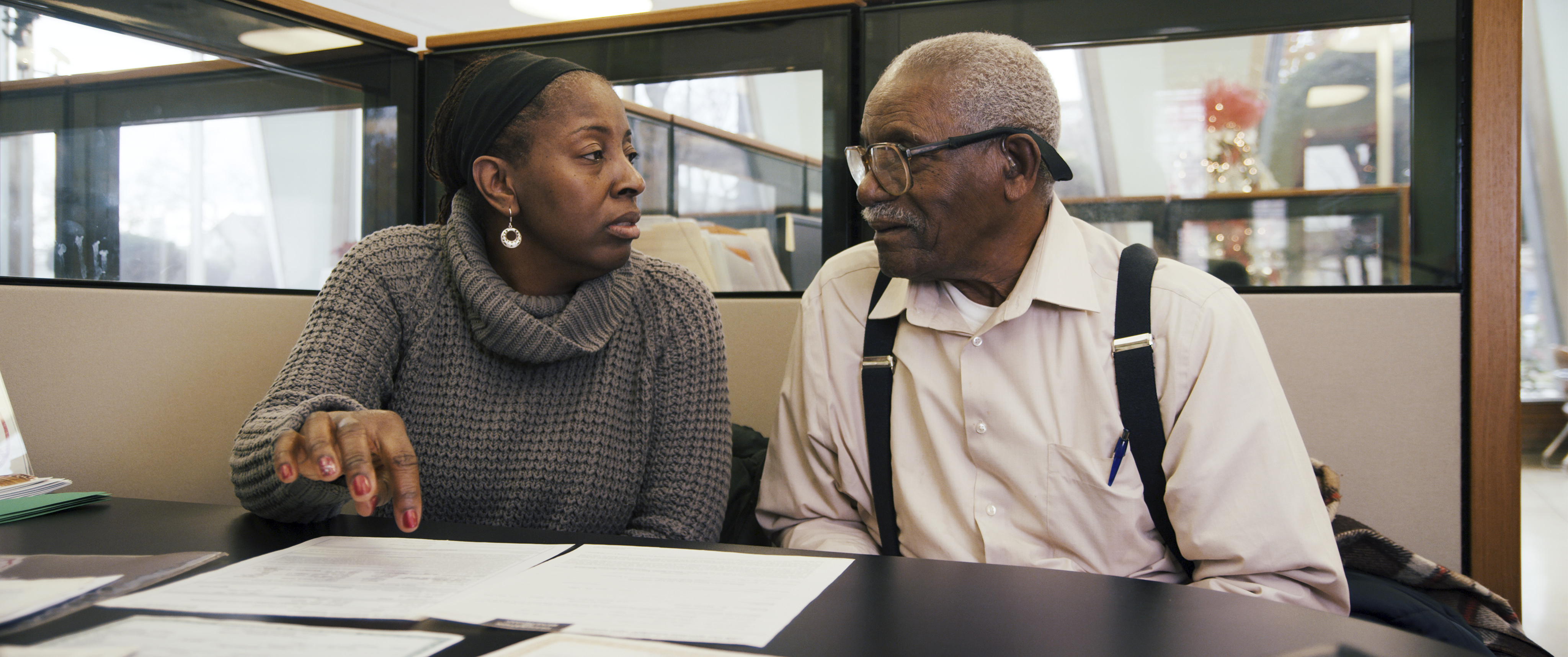
Question: And how did it go with filming at the bank? I still can’t believe that the customers let themselves be filmed like that.
Answer: Of the five workdays that we filmed in each bank, the first day was to get to know the place and the employees there. It was also to find out which advisors were truly open to working with us and hadn‘t just been passed on to us by their boss. Sometimes we shot preliminary footage in some offices. One realizes right away if someone has the basic capacity to be fully involved in talking with a customer in spite of the camera. Starting on the second day, we waited in the lobby of the bank and spoke with every person who came in. We gave them a flyer to read, introducing the project in the local language, and talked with them. On average, between 60-80%, and in some places, nearly all of the customers responded positively. Our agreement was to firstly film the meeting with the bank advisor, and then to see afterwards if those portrayed would sign the release form or not. Without their signatures, I cannot publicize the material. There was not a single case where the signature was not granted to us after filming. It seems that people felt themselves to be respected, felt comfortable, in front of the camera. In this manner, in eight countries, that is, eight banks, we collected about 150 stories.
Question: Why do you think that so many customers participated?
Answer: That surprised us too. I believe that many people thought that the idea was cool, and also pretty relevant. Nobody likes to sit at that desk and maybe it simply has to be seen, the way that we get treated there. In any case, in many of the dialogues, the impression arose that a lot of customers felt themselves to be misunderstood, rejected or judged wrongly. My impression was that many of those with this stance wanted to ‘make a statement‘. So they just gave it a try. Some of them certainly thought that they would get a better deal that day, since the bank would have a friendlier attitude when a camera was present.
Question: What were the considerations for choosing the countries where you filmed?
Answer: We wanted to shoot on as many continents as possible, portray the most influential global languages, and film in societies with different influences – religious, social or political. It would have been unthinkable not to have an Islamic republic, or a country shaped by colonialism or pronounced Catholicism, or a country with regards itself as the birthplace of capitalism – as well as we needed to have at least a former Soviet republic in the film. Unfortunately, countries currently under communist rule such as Russia or China didn‘t work out – neither did Dubai. It‘s too bad that we have only one Asian and no Arab countries in the film. However, it‘s a great thing to have rich Switzerland, and Naples, Europe‘s beautiful capital of the South. In light of the fact that it was so extremely difficult to budge any financial institutions to take part at all, we had to be open for compromises. There are eight countries now in the film, but I would have preferred to have two more, so that it would be even more complex. Just where one is, at any given moment, doesn‘t matter; it‘s somewhere on the planet ‘Money‘. Toward the end of the filming period, we got a totally unexpected permit to film in Japan, but by then we had run out of cash (laughs).
Question: How would you describe the editing phase?
Answer: In short, it was almost never-ending. It took us seven months to filter out the stories and put them into relation to each other in such a way that 85 exciting minutes could come out of it. Incidentally, I find that banking conversations tend to be pretty boring. We had to really take a detailed look to discover something great in the mostly banal exchanges. But this dimension, that something very important, human and universal turns up – it does exist, of course. The so-called needle in the haystack. In addition to that, we had quite a lot to translate and subtitle. The translators achieved great results over a long period of time, because in order to go into deep detail in conversations like this, every word has to be just right. The film editing, done by Frederik Bösing, was hard too, since this wasn‘t a story being told in the traditional sense, with three acts and a fixed cast of characters. Talking Money as a narrative is more of a provisional, absolutely obstinate, mysterious object that keeps subtly re-generating its own suspense and is composed of partly tiny elements, associations and layers of feeling. The people who appear in the film are wonderful and I believe one quickly takes a liking to them, but by then, one is already having to say goodbye to them too. Pretty frustrating! That had to be handled in the edit, too. After many screenings all over the world, however, I have the impression that the film manages something very essential: to make this invisible, incredibly powerful matrix that we call money, and that connects us all, into something visible and palpable – whether or not we happen to be sitting at the bank.
Question: I perceived that in the cinema as well, that an incredible concentration of suspense was present. That surprised me because, to be honest, I had thought beforehand that a film about banking and money wouldn’t be very entertaining…
Answer: I keep hearing that in the discussions with audiences. Most viewers are expecting a film that will explain something clever to them about the financial services system. Naturally, that doesn‘t happen here. Neither is it a film opposed to “the evil banks“. I would find that dull, as well, since that has become ‘common sense‘ these days and there are also great films about that. The question is rather: Why do we keep participating in this at all? One viewer in Bad Aibling said afterwards: “Luckily, the film was completely different than I had thought. The humanness in it really did me good!“ That‘s how it should be. It‘s about us, ourselves. I don‘t want to patronisingly instruct anybody – and, honestly speaking, even five years later I still don‘t understand much about financial products. If anything, my films should carry you into a space where you‘ve never been before. The cinema should transform into a bank and we should be able experience ourselves, together and very directly, within this crazy, extremely intimate situation. Cinema as a kind of minimalistic roller coaster ride that sadly can‘t be conveyed when solo and in front of a laptop. This experience truly requires this big, dark movie theater and all the ghosts that live there.
Translation by Qwigo L. Baldwin
